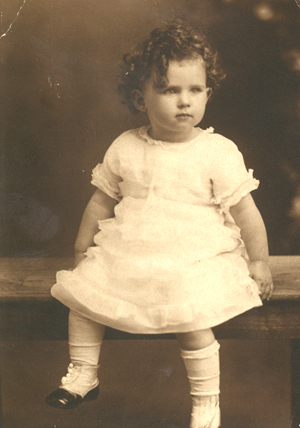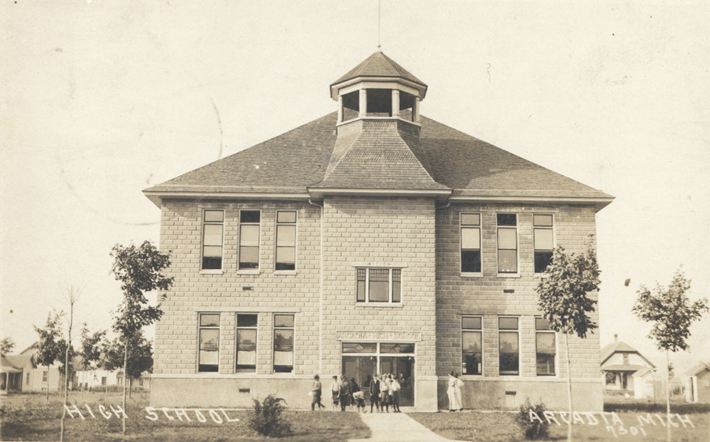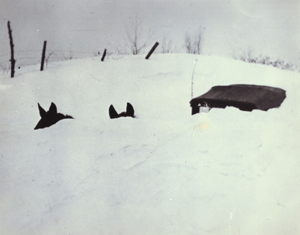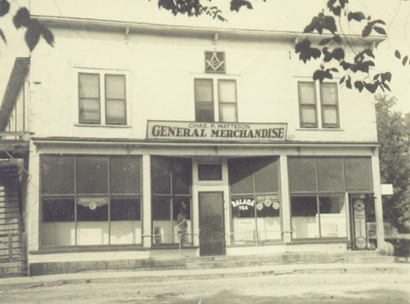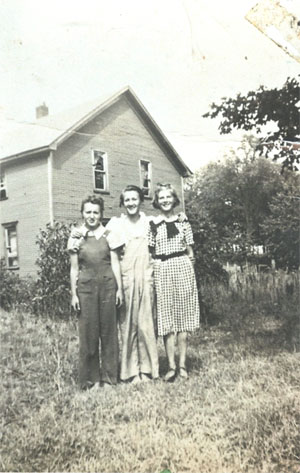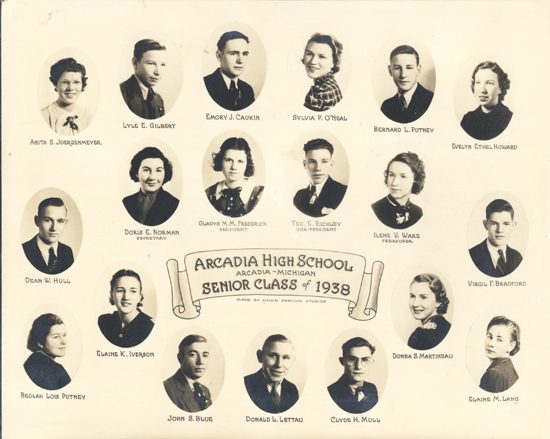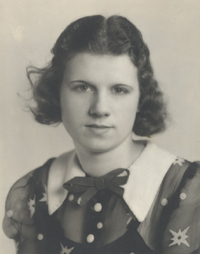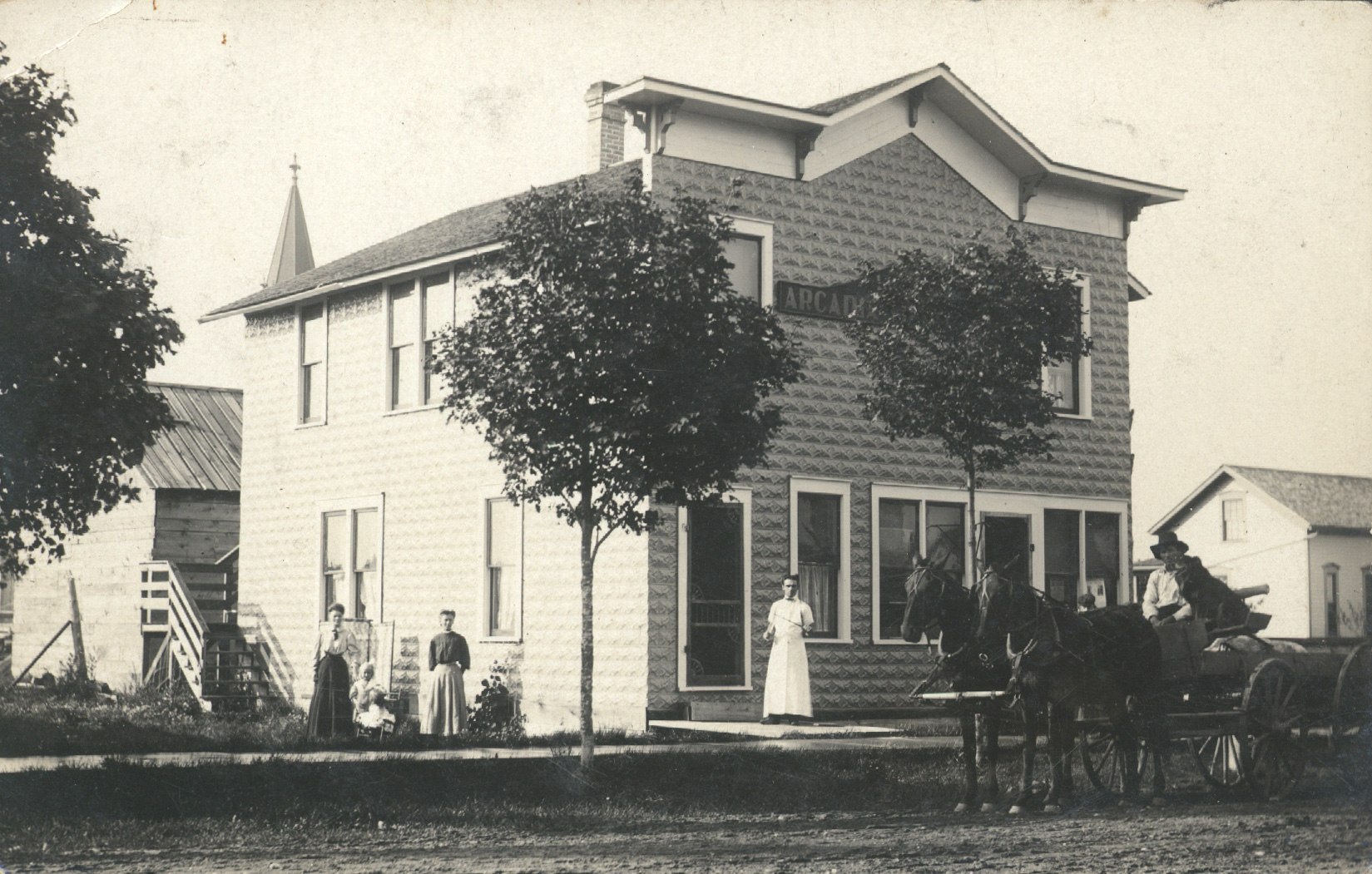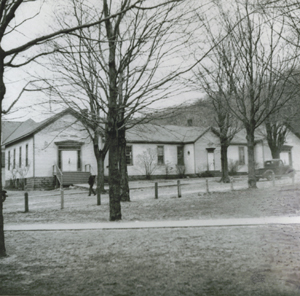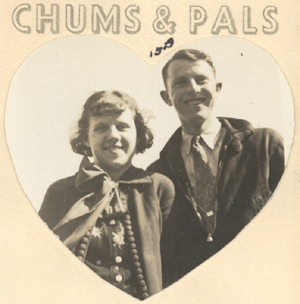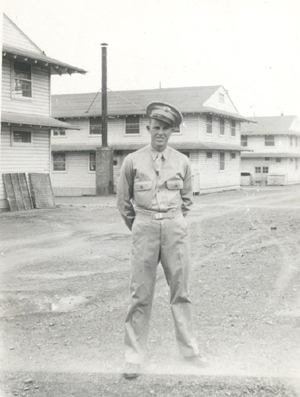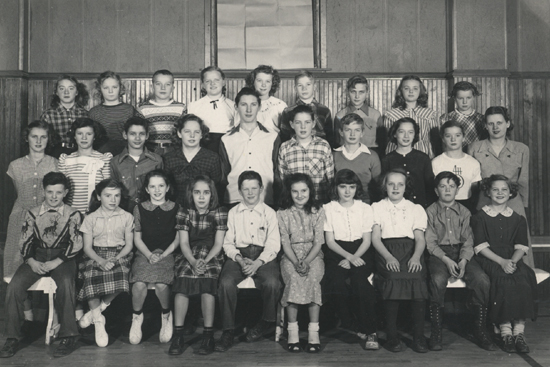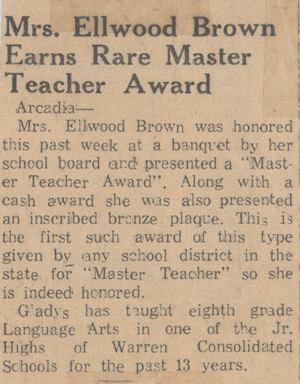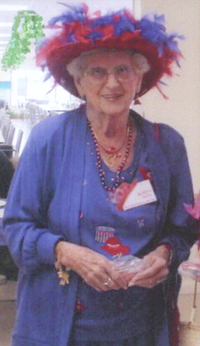My Story
By Gladys Frederick Brown
|
"My parents, Walter A. Frederick and Mary Baker Frederick were both raised in Frankfort, Michigan and lived next door to each other on Forest Ave. from the time they were children until they married. "They moved to Toledo, Ohio as Daddy had a job as mail clerk with the railroad that ran from Frankfort to Toledo. I was born there on June 14, 1920. Soon after, we moved to the Detroit area. While there, five brothers and sisters joined me." How I Got Here"At the onset of the Great Depression we lost everything and had to leave the Detroit area. "My grandpa, Milton Frederick, owned a grocery store in Frankfort and found us a house in Arcadia and a job for Daddy in his store. At the end of April '33, two cars, my parents, and us seven kids came to Arcadia. "All the way up from Detroit my Mother kept pointing at each shack along the way saying "That's the kind of house you'll live in." However, when we got there, the house was one of the biggest houses in town. I found out later that we rented it for $10 a month. Can you believe that today? "The house was on the corner of 22 and Oak Street. It had big poplar trees all around it, a big garden behind it. My husband in later life, Bub Brown, lived right across the street. Toward the end of his life he told all the nurses how he met me when he was thirteen years old. "The house was sold two or three years later. We then moved into the house on the corner of 4th and Mill. We lived there until I was a junior in high school, and then we moved to the farm outside of town. (The property is now owned by Jerry Brown, on Gilbert Road.)" Going to School in Arcadia"I went to school in the old school. Arcadia High School was a two-story building on Lake Street and 4th Street in Arcadia, Michigan. They had the elementary grades on the first floor. The high school was upstairs all in one room. "While attending school in the Detroit system, we were passed twice a year. My younger brother Bill was half a year behind me. In Arcadia, the 7th and 8th grades were in the same room, so he was in the same room with me. It took me a long time to realize there were two classes in the same room. It also took me a long time to keep my mouth shut when the 7th grade was reciting. "Mrs. Gertrude Chamberlain was the teacher. When anyone mentioned the old school, they mentioned Mrs. Chamberlain. Each year you had to take the subjects the teachers were able to teach. Therefore, a lot of us didn't get Latin or typing or things like that, because there wasn't a teacher for those subjects. Still, the teachers we had were dedicated, and we received a good education. "Another adjustment we had to make when moving to Arcadia was that there were very few kids in town. Then too, because we moved so late in the school year, we were not enrolled and didn't get to meet others our age right away. Not going to school was a lot of fun for a day or two, but didn't stay that way after a couple weeks. We were happy to see the time later when all the country school kids had to come into town for high school and stay, because there wasn't a school bus system them. (The country kids came into town each fall to stay with families for the school term.) That gave us a bigger selection of friends!" Living in Arcadia"I remember thinking when I got here that the town was small and quiet. (Still is.) And no telephones! During the war, when a telegram came, it would be come to the drugstore (corner of 2nd and Lake), and Albert Martineau would deliver it. "We were lucky to have two doctors. Dr. Jamieson made all his calls on horseback. Dr. Vursema took patients into her house (corner of Pine and Second). We didn't have cars to go out of town to a doctor. Dr. Jamieson did an awful lot of operating on the kitchen table I've heard of taking out tonsils and appendixes, stuff like that. "Mr. Edwards was the local undertaker, and lived in a home on Division Street, behind the present town hall. It burned down quite a few years ago. The undertaking parlor was located between the present town hall and the high school. I'm told he did his work on the kitchen table too! "The undertaker had a house behind where the town hall is now, except it burned down a few years ago. And then Edwards had an undertaking parlor between where the town hall is now and where the school was. "Across the street they tell me there was a saloon, but I don't remember it. Matteson's Hotel had a small one too, but the saloon was a real bar as we know it today. "Across from the Matteson Hotel was Matteson's Store, which was a nice, big store. And along side it was a Wareham Store. I think it was more like clothing and things, but they were both big stores. And you come this way and there was a blacksmith, and they had living quarters above it. When we were in high school, the fellow that ran the blacksmith shop taught the kids metal work. They made little tiny frying pans and horseshoes that are probably now in every house. That was the boys shop class. "Down on the corner across from the post office was Eberts store. It was on the corner of 3rd and Lake in the empty lot along side of the museum. That, I remember was the post office when I came. We had to go to Eberts' for the mail. "Kalbitzer's was a dime store. We used to go there for penny candy." Moving to the Farm"When we first came up, Daddy worked as a clerk in grandpa's grocery store in Frankfort. Then he decided he wanted to go back to the railroad as a mail clerk. He worked on a route between Toledo and Frankfort spending one night in Frankfort and one night in Ohio. Mom stayed home, of course. "He didn't want his kids running around loose in town... especially five boys. So we moved out to the farm, where my parents lived the rest of their lives. (near Norconk and Fredrick Road where Jerry Brown lives now) The first day we got there Daddy said, "I don't want either one of you girls or your mother to ever get in that barn. There's five boys, and they're doing the chores." We did washing and ironing and stuff like that, but not farm chores." Winter in Arcadia"There wasn't dating as we know it today. Nobody had a car. What we did a lot of was go down behind the factory, and I don't know where that hill has disappeared, but there was a hill behind the factory, and we used to call it the "Sand Hill." We'd go down there on jumpers. Do you know what they are? They had a J and then a flat seat on 'em, and you sat on the seat and held onto it and put your legs up and went down the hill. "Or ice skating on the lake. They'd clear off a section of it. Never Lake Michigan, of course. "Or we'd go down and play in the icebergs. We had big icebergs with caves in them. We didn't have to make them; the water did, and we'd hide in those and play on them. I don't think we have icebergs any more. I haven't heard anyone talk about them." |
|
|
|
|
|
"I remember a lot of winter storms and LOTS of snow. This was before the big snow plows. Of course lots of times when we had a big storm we'd lose electricity. Once that happened we'd be shut off from the rest of the county. Many a time there weren't any trucks in town with food for a week or so. There wasn't any bread in town or flour or anything like that, because the trucks couldn't get through. We would share bread starter etc. and snow shoveling. After a big snow, everybody in town, girls and boys, went out and helped plow snow. I remember the snow plow stuck out near the bridge many a time, and everyone in town would go out and help shovel, so we could start getting deliveries of things again. "When we were living on the farm, when the snow got bad -- and it got bad because they didn't have many plows -- we didn't have school, and my brother and I would walk about a mile up Norconk Road to Elaine Iverson's, who had an older sister. The four of us -- my brother and I and Elaine and Phyllis -- would play cards." Entertainment"We made our own entertainment. No one had roller skates or anything like that. We might have played with paper dolls, but that was about it. With seven kids you didn't need a whole lot of toys. "I don't think as a kid we ever did leave Arcadia. If we went away for a basketball game, that was a big event. That was about the only time as a child that I left Arcadia, and then I was a high school kid. Daddy went back and forth to grandpa's in Frankfort, but that was about it. "They had free shows here in town. That was our entertainment. Where the tennis court is now, they would put up a tent sometimes. There was a permanent screen too for movies. One day a week we'd have a free show, and everyone who had horse and buggy and so forth would come. And the next night the show might be in Bear Lake. You brought your own popcorn or whatever. The movies were generally Westerns. You sat on the ground. Sometimes we met fellows from other towns, if they could get there. "In high school I played basketball, so there was a girl's basketball team, but I don't remember much about it. Of course, the boys had basketball and baseball. Arcadia has never had football." High School Graduation |
|
|
|
|
Teaching in a Rural School"When I got out of high school, it was still the depression, and there were no jobs. I went to Frankfort and lived with my grandparents and went to County Normal, a first-year college for teachers, because there weren't any jobs and nothing else to do. I think that's why so many girls became teachers. The college is not there any more. "I started out in a little Indian settlement between Petoskey and Charlevoix, a town called Bay Shores. My students were mostly Indian children. I had to make my own fire in the morning and did the janitor work, of course. I also had to cook a meal for the whole room full of kids each day. I taught all eight grades, but when I arrived, they decided to send the two 8th grade boys to Petoskey. They were taller than I was. They must have felt sorry for me, as I was only 18. I only taught there one year. "The school couldn't afford to pay both me and the bus driver every period. Generally I would get paid one time and then the bus driver would get paid the next time. But at the end of the year I got paid all that was owed to me, $675 for the year." Marriage to Bub Brown"After that I moved to the Detroit area. There were jobs there. Unfortunately that's when the war started, and everyone was involved in the war effort. "After the war I married my childhood sweetheart Bub Brown. He had volunteered at the start of action and, after training, took part in the invasion and was still very involved until after the Battle of the Bulge." Back to Arcadia"After the war we came back here to Arcadia. Across from where the museum is today in place of the tiny white house there now was a big two-story building called the Arcadia Meat Market. It had galvanized tin on the side, so you can't mistake the building when you see a picture. After the war that's where Bub, Bonnie, and I lived. It had been converted into a house. Bub's grandmother Mrs. Strien inherited it, and that's how we got into it."
|
|
Teaching in Arcadia"Daddy (Walter Frederick) was on the school board in Arcadia. They were having trouble finding a teacher, so he convinced me to teach "temporarily" in Arcadia. I taught 4th and 5th grades in the same room, and I ended up teaching in Arcadia for several years." |
|
|
|
|
I Taught for Thirty Years"After three years I left Arcadia to teach in Elberta for a year. "For two years I taught in Coquille, Oregon, just 8 miles from the California border, but that was too far from home. When Grandpa died, I couldn't come home. And when my sister got sick, I decided it was just too far away, so we came back to Michigan for good. "By going to school myself at night and in summers, I eventually earned a teaching certificate. I went to extension school in the summer at Mt. Pleasant. I finished my bachelor's at Wayne State. "I taught 30 years, raised three kids of my own, and retired from Warren Consolidated Schools in 1978. 1940-1941: Bay Shore 1947-1950: Arcadia 1950-1951: Elberta 1951-1953: Coquille, Oregon 1953-1954: County Line 1955-1956: Guardian Angels 1956-1978: Warren Consolidated Schools (including 8 years at County Line and 14 at Hartsig)" Now I Enjoy Retirement"I work in the historical museum. I organize class reunions. I'm active in reunions of Bub's military group. I read. I exchange email with friends. I just enjoy my family and friends." |
|
